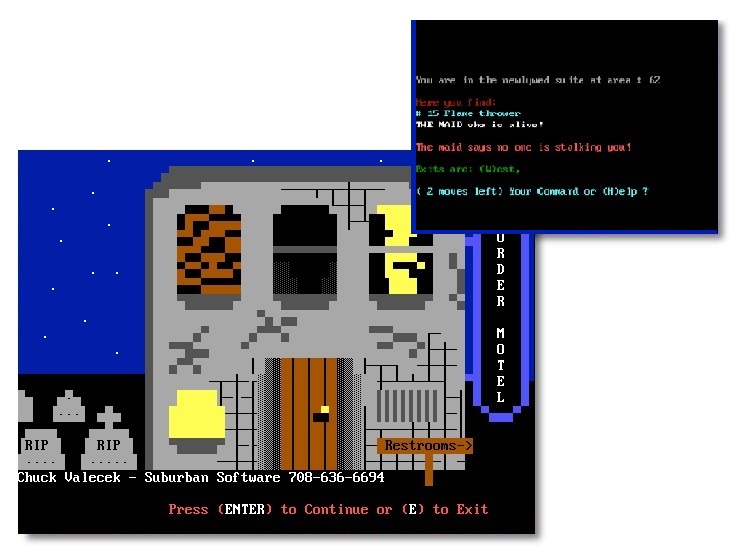DOORgames
what is a doorgame?
One of the reasons BBSes were such a success is that computer users finally had a place to not only experience content, but discuss it at the same time. While internet forums have their good days and many, many bad ones, this staple of online life rose to prominence in BBSes. And what better to talk about on a BBS message board than the BBS game you and your friends were playing?
Of course, the slow transfer speeds kept BBSes strictly limited to ASCII and ANSI characters, which meant that any games (called “door games”) would look ancient compared to Nintendo and mainstream computer games. Additionally, the fact that a BBS would typically only use one phone line (and could only have one caller at a time) forced any multiplayer game to be asynchronous by design.
Despite these limitations, programmers put on their creative caps and came up with innovative solutions that allowed multiple people to exist in the same virtual game world, playing with and competing against each other. RPG door games weren’t all MUDs (although those existed on BBSes); many often contained their own special brand of gameplay that emphasized solo exploration, cooperative activities, and even rudimentary PvP struggles.
Listed below are a few of the most popular games available on The ROCK! Login and ENJOY!
TradeWars 2002
First Release: 1991
Creator: Gary Martin
Trade Wars is a series of popular computer games dating back to the early days of personal computing. Inspired by Hunt the Wumpus, the board game Risk, and the original space trader game Star Trader, Trade Wars was the first multiplayer game of the space trader genre. During the height of its popularity in the early 1990s, Trade Wars was the preeminent BBS game, played by tens of thousands of users around the world.
Though specifics vary between versions, in general the player is a trader in a galaxy with a fixed set of other players (either human or computer). The players seek to gain control of resources: usually fuel, ore, food, and equipment, and travel through sectors of the galaxy trading them for money or undervalued resources. Players use their wealth to upgrade their spaceship with better weapons and defenses, and fight for control of planets and star bases.
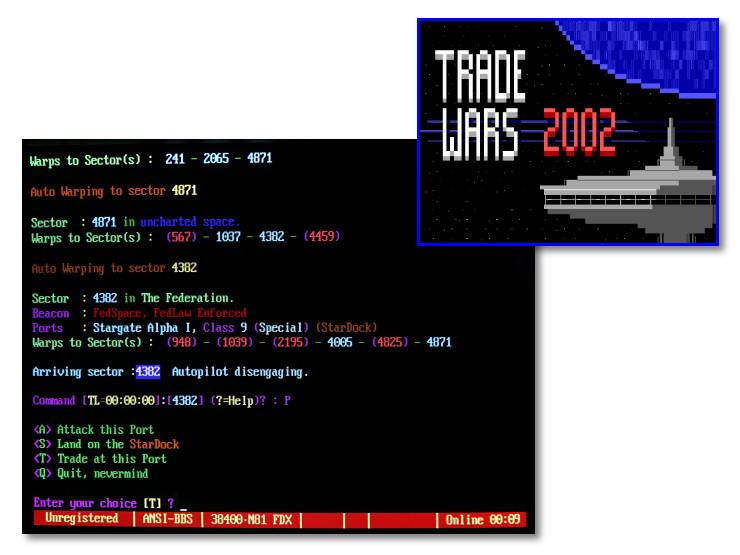
l.o.r.d
First Release: 1989
Author: Seth Robinson
Along with TW2002, Legend of the Red Dragon (commonly abbreviated as “LORD”) remains one of the best known and most popular BBS door games. LORD gained its popularity from its simple, pick-up-and-play design that distilled a fantasy RPG down to its most basic elements: repetitive combat, leveling, and equipment upgrades. Add to that a teenage-level depiction of sexuality (courting and potentially marrying Violet), chance events that bring a gambling-like thrill to the action, and a dose of humor, and you have a classic. LORD innovated by linking up with third-party software modules, allowing site-based customization that enabled the title to remain fresh over the decades.
The premise of LORD is that a Red Dragon is wreaking havoc in a town where the player has recently arrived. Multiple players compete over a period of weeks to advance their skills and to kill the dragon. In order to achieve this goal, players must face combat to gain experience. Once they have gained enough experience, they must face their master at Turgon’s Warrior Training and advance in skill level. Advancement increases the players fighting stats and gives an additional skill point in the current skill (up to 40). Advancement also presents stronger enemies and masters; a player must challenge and defeat master Turgon himself to reach level 12, the final level, before attempting to search for and slay the dragon.
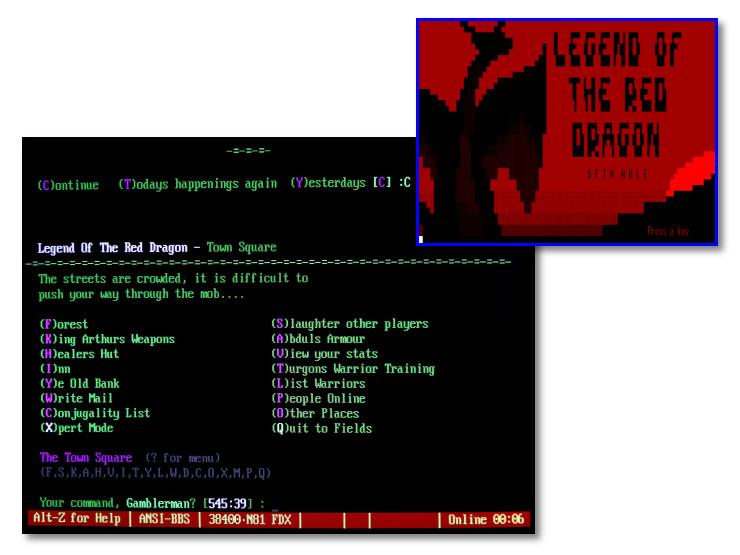
freshwater fishing
First Release: 1989
Creator: Eric Hamilton
Freshwater Fishing Simulator is exactly what its title says, a simulation of the freshwater fishing experience, down to the rod and bait you choose and the underwater terrain of the lake you’re exploring. While a rare sight on modern telnet BBSes, this graphically rich title (ANSI graphics, that is) always provides a welcome break from fantasy and space combat games that tend to dominate the BBS door platform.
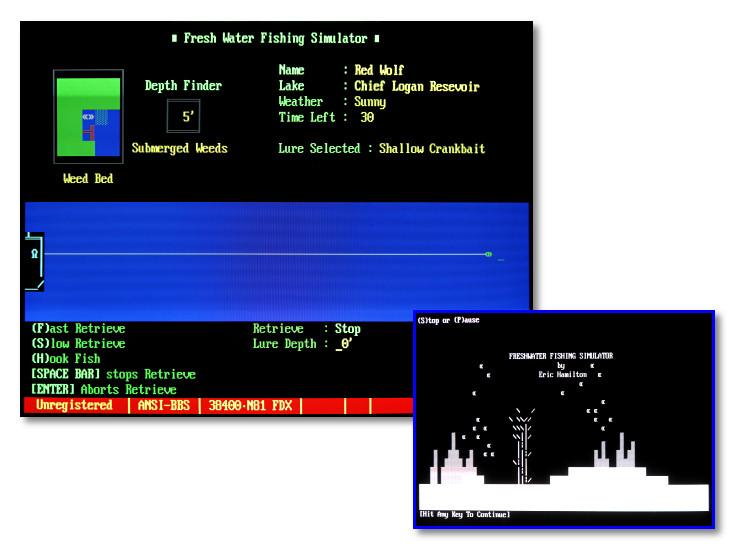
pimpwars
First Release: 1990
Creator: Paul Martino
PimpWars is a DOS-based door game for bulletin board systems created in 1990 by Paul Martino. The author gave up development of the game in the late 1990s, but the community continued to contribute to the game and its code. The later development of PimpWars was done by James Coyle (also the author of Mystic BBS), who had released versions for DOS, Windows, and Linux.
PimpWars combines resource management, business simulation, and a hint of Monopoly with the world of black market prostitution. In other words, it was the perfect game for a teenage boy to play on a BBS back in the 1990s — and that was the BBS world’s primary demographic in most areas. Despite an off-color theme that sees you playing as a pimp managing a stable of prostitutes, PimpWars boasts surprisingly deep gameplay as you attempt to build your empire to the point where you can purchase a local restaurant.
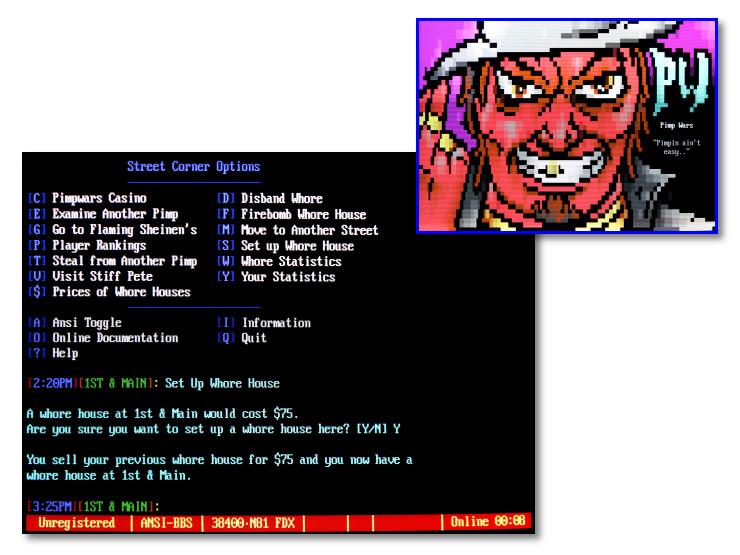
murder motel
First Release: 1989
Creator: Sheldon Pasciak
Murder Motel is a death-match-style door game for bulletin board systems in which the player checks into a hotel and tries to find and kill other players, while eluding death himself. Murder Motel was created by Sheldon Pasciak of Dog-Star Software and first released on July 11, 1989. Pasciak developed Murder Motel as a PC clone of the “Murder Motel” door game for Commodore BBSes by Sean D. Wagle. Pasciak’s version expanded in new directions, including a feature which enabled sysops to create custom motel maps. In 1993, the source code was passed to Chuck Valecek, who took over maintenance of the game. Valecek described Murder Motel as having elements from the movies “Psycho” and “Mad Max Beyond Thunderdome.” A similar game, “Murder Motel 2114,” was released in 1996 by Austin Luminais of Unlsoft.
Before a player can enter the motel, he must choose a target opponent to murder. The motel itself is essentially a maze of rooms and hallways and one-way passages. The player must go through the rooms looking for parts to build a weapon; defenses that can be used against particular weapons; and the target. The player also needs to seek a room to hide once his turns are exhausted. Unlike the similar game “Murder Mansion,” Murder Motel is not a “Clue”-style mystery game where the players try to discover who the murderer is. Murder Motel is turn-based, which means players have a fixed number of turns they can play each day. This number is set by the sysop.
